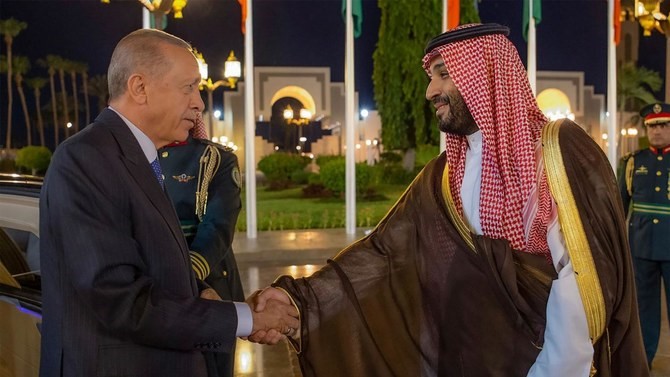Analysts say Ankara-Riyadh ties are improving as the bilateral relationship continues to warm following the signing of a big defence export pact.
During his official tour of the Gulf this week, Turkish President Recep Tayyip Erdogan signed a number of agreements with Saudi Arabia late on Monday, which many experts saw as a signal about the future of the two countries’ defence cooperation.
They included a critical defence cooperation agreement and a drone supply arrangement between the Saudi Ministry of Defence and Turkish defence equipment producer Baykar.
Saudi Defence Minister Prince Khalid bin Salman emphasised the significance of these agreements, adding that they aim to improve the Kingdom’s military forces’ readiness and strengthen the country’s defence and manufacturing capabilities.
Baykar CEO Haluk Bayraktar stated that the arrangement was the largest defence and aviation export contract signed by a Turkish company to date. His brother, Erdogan’s son-in-law, Selcuk Bayraktar, is the company’s chairman of the board and chief technical officer.
Baykar is well-known for its Bayraktar TB2 drones, which are equipped with laser-guided missiles and cost around the same as American and Israeli drones. Turkiye will also deliver an unspecified number of Bayraktar Akinci medium-altitude, long-endurance armed drones to Saudi air and naval forces as part of the agreement.
The deal also includes technology transfers and joint-production projects to help both countries boost their high-tech development capacities. Another agreement is anticipated to be finalised for the procurement of Turkish smart munitions and other payloads, with ambitions to manufacture them in the Kingdom.
“This significant development is undoubtedly the beginning of a new era in Turkish-Saudi relations,” Sine Ozkarasahin, a defence expert at Istanbul’s Centre for Economics and Foreign Policy Studies (commonly known as EDAM), told Arab News.
She anticipates “more collaboration between Ankara and Riyadh in the defence industry, particularly in segments such as air defence and missiles, but particularly in smart weapons, such as autonomous and uncrewed systems and other (artificial intelligence-driven) technologies” in the future.
“Both countries are heavily invested in (research and development) in the military sector,” she noted. According to their Vision 2030 manifesto, Saudi Arabia is now one of the pioneering countries leading the Middle East’s AI breakthrough.
“Deals like this also demonstrate that they see potential in Turkiye’s rapidly expanding defense-technological industrial base.”
Turkiye has offered domestically built and produced drones, particularly those manufactured by Baykar, for sale to friendly countries with which Ankara aims to enhance ties over the last four years.
Armed Turkish drones, such as the Bayraktar TB2, have proven useful in a variety of war zones, including Syria, Iraq, Somalia, Libya, and Nagorno-Karabakh.
The TB2 in particular has established a well-deserved reputation as a highly capable and cost-effective platform, playing a critical role in promoting and driving the Turkish defence aeronautics industry’s expansion.
In the early days of the battle with Russia, Ukrainian forces employed the flagship Turkish drone for strategic communication, and they were credited with helping to halt the Russian advance.
Turkiye has inked agreements for the co-production of unmanned aerial vehicles with many countries between 2019 and 2023, including Kazakhstan, Ukraine, and now Saudi Arabia.
The Kingdom is the seventh country to buy Akinci drones from Baykar, and the current arrangement implies that Turkiye has successfully expanded its drone sales to cover all of the affluent Gulf kingdoms. The agreement with Riyadh also sends a strong signal that relations between the two countries are improving.
Meanwhile, Baykar is working on an unmanned fighter plane, demonstrating Turkiye’s ongoing commitment to expanding its capabilities in the unmanned aviation industry.
According to Leo Peria-Peigne, a research fellow at the French Institute of International Relations’ Security Studies Centre in Paris, after several years of chilly relations, ties between Riyadh and Ankara are warming, and Turkish authorities are actively seeking to use armaments agreements as part of this process, not only with the Kingdom but also with other countries such as the UAE and Egypt.
“Right after the end of the Kingdom’s blockade of Qatar, rumours emerged about a potential armaments contract between (Riyadh and Ankara), especially on UAVs (unmanned aerial vehicles), rumours that were used as proof of an improvement in relations,” he told Arab News.
“Also, because the majority of the profit on these deals is made in training and maintenance services, an armaments contract is some kind of guarantee that both countries will keep good relations for a while.”
As the Turkish economy suffers with hyperinflation, the defence industry, according to Peria-Peigne, provides an effective approach to draw an influx of foreign currency.
“Armament contracts are also used by Ankara to boost its diplomatic attractiveness and support its’seduction efforts,’ particularly with African and Central Asian countries,” he added.
Meanwhile, Peria-Peigne stated that the industrial benefits expected from such agreements will help Saudi Arabia diversify its economy in line with the goals of its Vision 2030 agenda, which calls for half of the country’s military equipment to be manufactured locally by the end of the decade.
Source: Arab News


